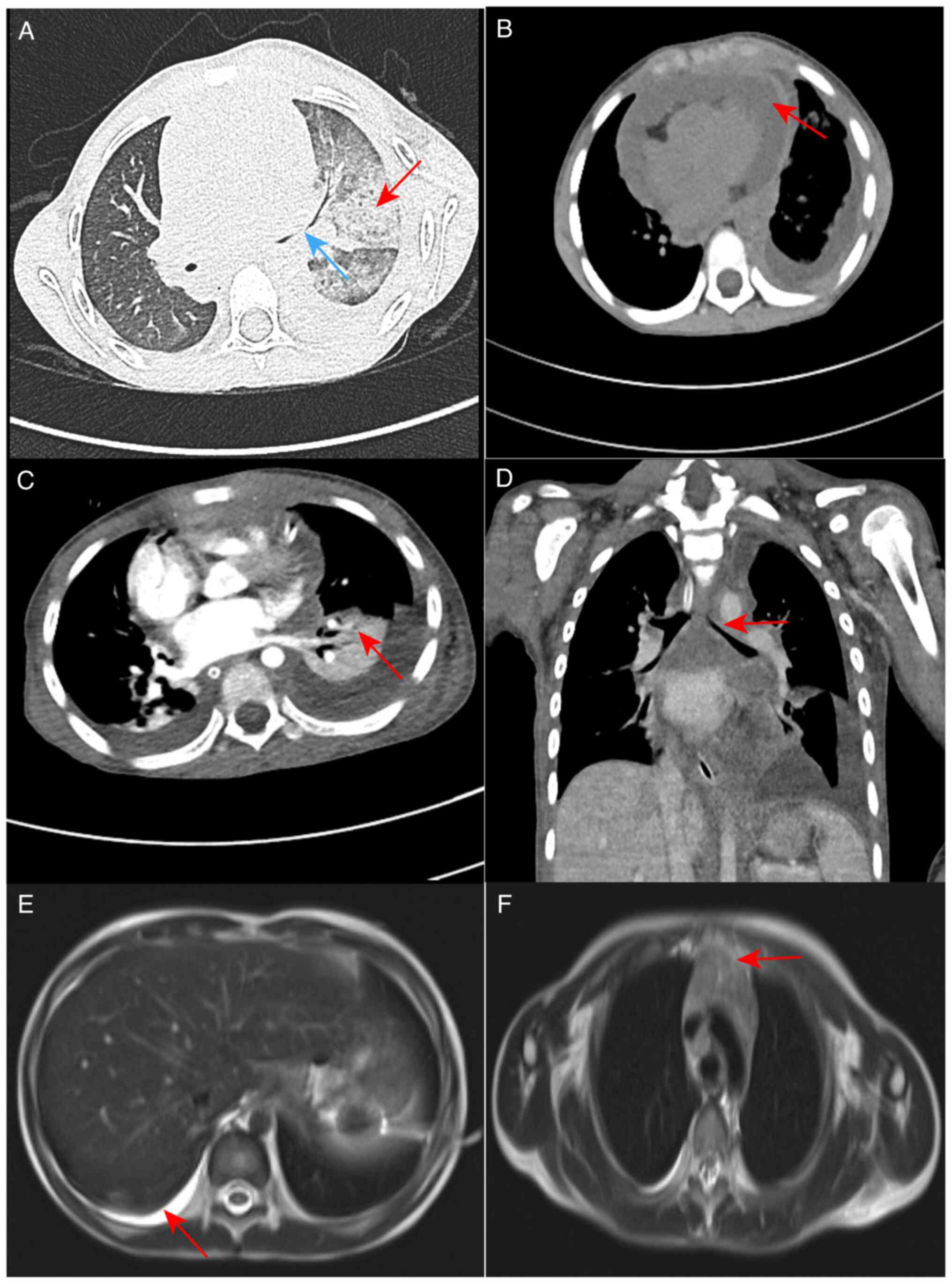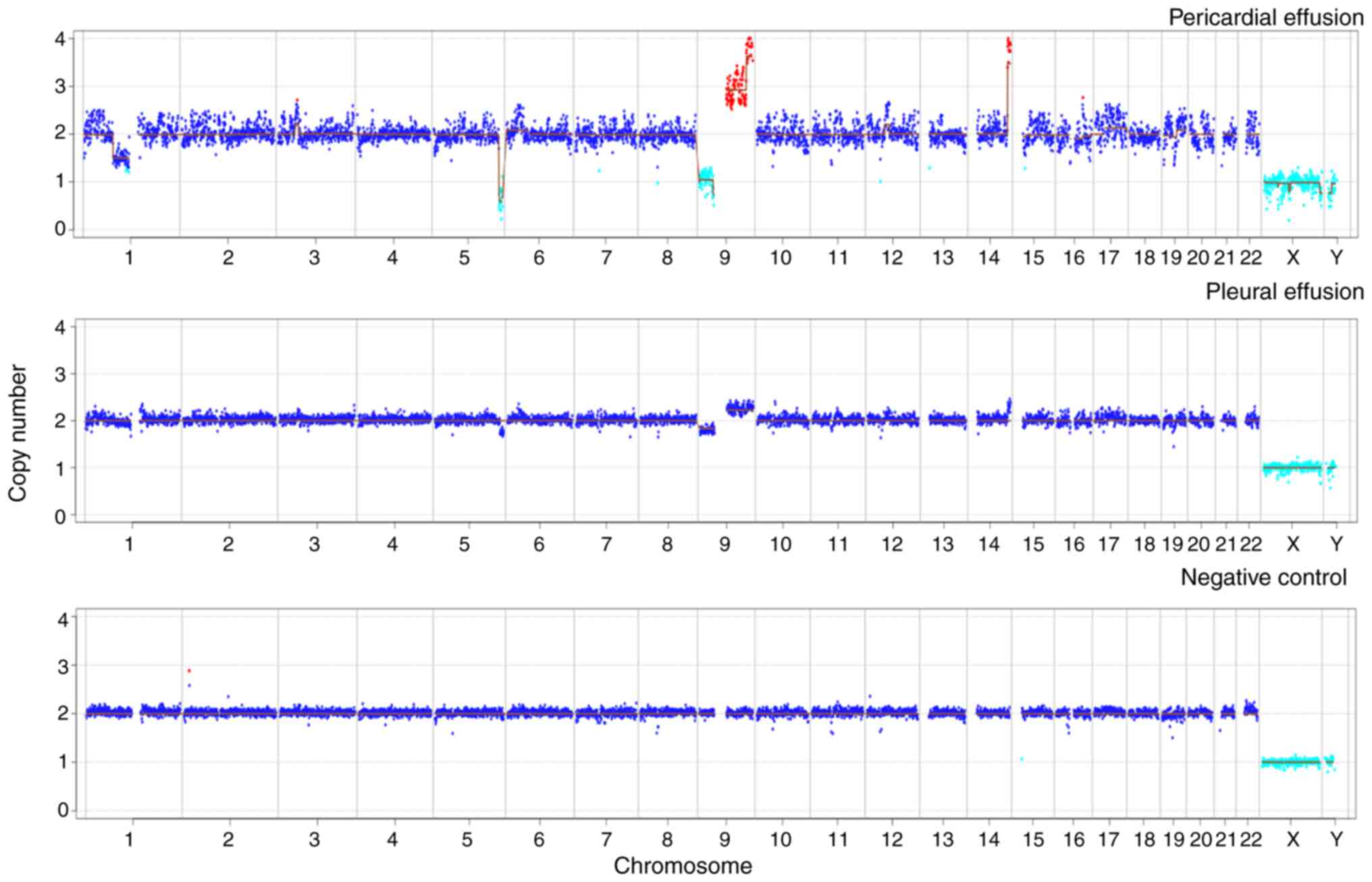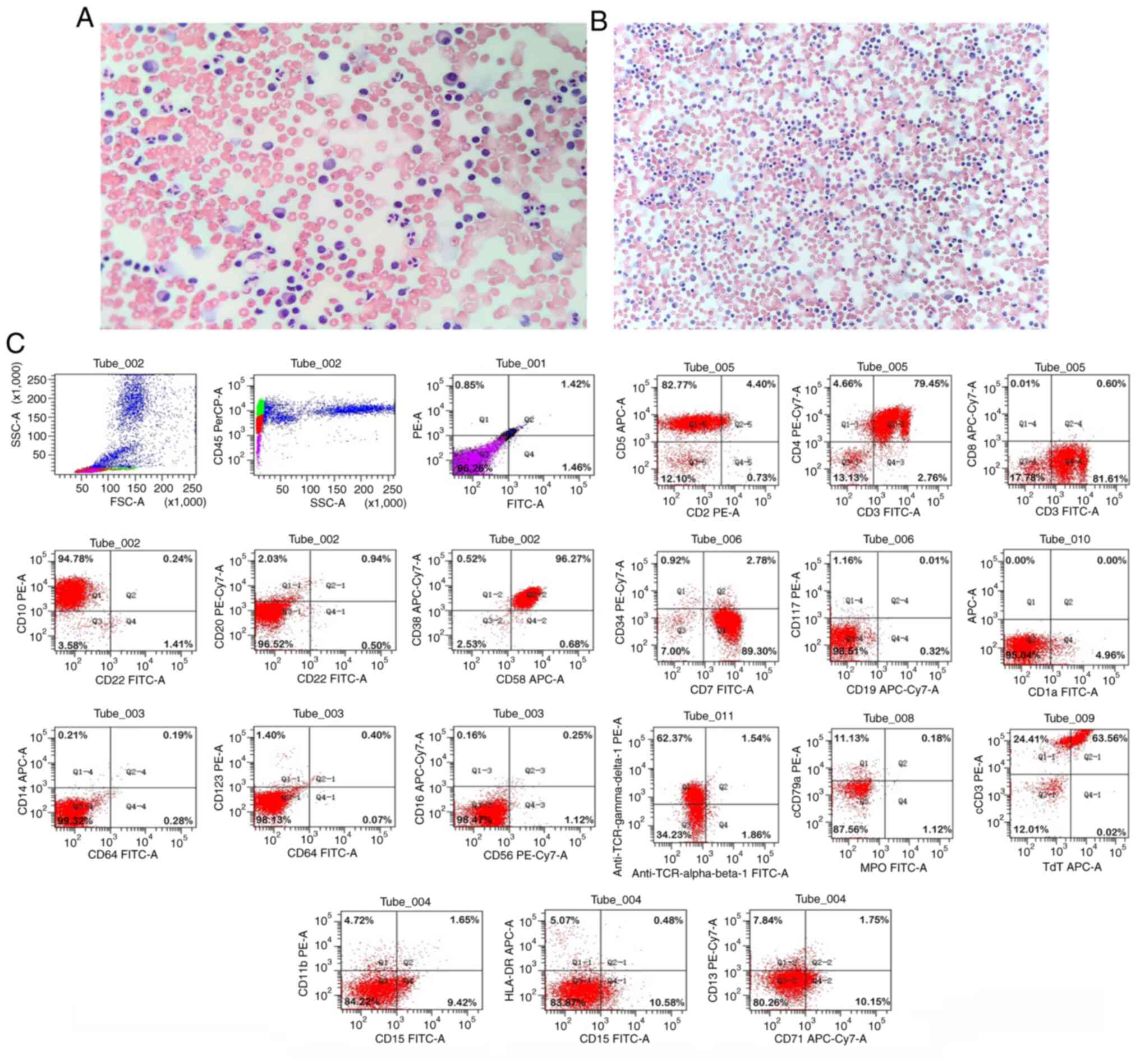|
1
|
Cortelazzo S, Ponzoni M, Ferreri AJ and
Hoelzer D: Lymphoblastic lymphoma. Crit Rev Oncol Hematol.
79:330–343. 2011. View Article : Google Scholar : PubMed/NCBI
|
|
2
|
Park HS, McIntosh L, Braschi-Amirfarzan M,
Shinagare AB and Krajewski KM: T-cell non-hodgkin lymphomas:
spectrum of disease and the role of imaging in the management of
common subtypes. Korean J Radiol. 18:71–83. 2017. View Article : Google Scholar : PubMed/NCBI
|
|
3
|
Swerdlow SH, Campo E, Pileri SA, Harris
NL, Stein H, Siebert R, Advani R, Ghielmini M, Salles GA, Zelenetz
AD and Jaffe ES: The 2016 revision of the World Health Organization
classification of lymphoid neoplasms. Blood. 127:2375–2390. 2016.
View Article : Google Scholar : PubMed/NCBI
|
|
4
|
Vose J, Armitage J and Weisenburger D:
International peripheral T-cell and natural killer/T-cell lymphoma
study: Pathology findings and clinical outcomes. J Clin Oncol.
26:4124–4130. 2008. View Article : Google Scholar : PubMed/NCBI
|
|
5
|
Hogan CA, Yang S, Garner OB, Green DA,
Gomez CA, Dien Bard J, Pinsky BA and Banaei N: Clinical impact of
metagenomic next-generation sequencing of plasma cell-free DNA for
the diagnosis of infectious diseases: A multicenter retrospective
cohort study. Clin Infect Dis. 72:239–245. 2021. View Article : Google Scholar : PubMed/NCBI
|
|
6
|
Gu W, Talevich E, Hsu E, Qi Z, Urisman A,
Federman S, Gopez A, Arevalo S, Gottschall M, Liao L, et al:
Detection of cryptogenic malignancies from metagenomic whole genome
sequencing of body fluids. Genome Med. 13:982021. View Article : Google Scholar : PubMed/NCBI
|
|
7
|
Tivey A, Church M, Rothwell D, Dive C and
Cook N: Circulating tumour DNA-looking beyond the blood. Nat Rev
Clin Oncol. 19:600–612. 2022. View Article : Google Scholar : PubMed/NCBI
|
|
8
|
Alvarnas JC, Brown PA, Aoun P, Ballen KK,
Barta SK, Borate U, Boyer MW, Burke PW, Cassaday R, Castro JE, et
al: Acute Lymphoblastic Leukemia, Version 2.2015. J Natl Compr Canc
Netw. 13:1240–1279. 2015. View Article : Google Scholar : PubMed/NCBI
|
|
9
|
Tianyou Wang XS, Zhang Y, Tang J, Jin L,
Yang J, Duan Y, Zhou C, Gao Z and Qu X: Childhood lymphoblastic
lymphoma treatment standard (2019 update). National Health
Commission of the PRC. 716:10–29. 2019.(In Chinese).
|
|
10
|
Koprivnikar J, McCloskey J and Faderl S:
Safety, efficacy, and clinical utility of asparaginase in the
treatment of adult patients with acute lymphoblastic leukemia. Onco
Targets Ther. 10:1413–1422. 2017. View Article : Google Scholar : PubMed/NCBI
|
|
11
|
Zhang HL, Bai ZY, Zhang MX and Xi YF:
Advances in molecular genetics of acute T lymphoblastic
lymphoma/leukemia. Zhonghua Bing Li Xue Za Zhi. 49:870–873.
2020.(In Chinese). PubMed/NCBI
|
|
12
|
Zhang Hong CB: Clinical analysis of 241
cases with multiserosal cavity effusion. J Clin Int Med.
20:644–646. 2003.
|
|
13
|
Losada I, González-Moreno J, Roda N,
Ventayol L, Borjas Y, Domínguez FJ, Fernández-Baca V,
García-Gasalla M and Payeras A: Polyserositis: A diagnostic
challenge. Intern Med J. 48:982–987. 2018. View Article : Google Scholar : PubMed/NCBI
|
|
14
|
Li Jiao ZY, Qu Yi and Mu Zhi:
Evidence-based evaluation of the diagnostic value of adenosine
deaminase in tuberculous serosal cavity effusion. Chin J
Evidence-Based Med. 10:495–498. 2010.
|
|
15
|
Portell CA and Sweetenham JW: Adult
lymphoblastic lymphoma. Cancer J. 18:432–438. 2012. View Article : Google Scholar : PubMed/NCBI
|
|
16
|
Liu K, Gao Y, Han J, Han X, Shi Y, Liu C
and Li J: Diffuse large B-cell lymphoma of the mandible diagnosed
by metagenomic sequencing: A case report. Front Med (Lausanne).
8:7525232021. View Article : Google Scholar : PubMed/NCBI
|
|
17
|
Mohammad NS, Nazli R, Zafar H and Fatima
S: Effects of lipid based multiple micronutrients supplement on the
birth outcome of underweight pre-eclamptic women: A randomized
clinical trial. Pak J Med Sci. 38:219–226. 2022.PubMed/NCBI
|
|
18
|
Wei P, Gao Y, Zhang J, Lin J, Liu H, Chen
K, Lin W, Wang X, Wang C and Liu C: Diagnosis of lung squamous cell
carcinoma based on metagenomic next-generation sequencing. BMC Pulm
Med. 22:1082022. View Article : Google Scholar : PubMed/NCBI
|
|
19
|
Shlien A and Malkin D: Copy number
variations and cancer. Genome Med. 1:622009. View Article : Google Scholar : PubMed/NCBI
|
|
20
|
Taylor AM, Shih J, Ha G, Gao GF, Zhang X,
Berger AC, Schumacher SE, Wang C, Hu H, Liu J, et al: Genomic and
functional approaches to understanding cancer aneuploidy. Cancer
Cell. 33:676–689.e3. 2018. View Article : Google Scholar : PubMed/NCBI
|
|
21
|
Guo Y, Li H, Chen H, Li Z, Ding W, Wang J,
Yin Y, Jin L, Sun S, Jing C and Wang H: Metagenomic next-generation
sequencing to identify pathogens and cancer in lung biopsy tissue.
EBioMedicine. 73:1036392021. View Article : Google Scholar : PubMed/NCBI
|
|
22
|
Zheng D, Zeng L, Gu H and Guan X: Clinical
studies of cell chromosomal detection in the diagnosis of malignant
multiserosal cavity effusion. Chin J Clinicians (Electronic
Edition). 3:602–607. 2009.
|
|
23
|
Yan L, Sun W, Lu Z and Fan L: Metagenomic
next-generation sequencing (mNGS) in cerebrospinal fluid for rapid
diagnosis of Tuberculosis meningitis in HIV-negative population.
Int J Infect Dis. 96:270–275. 2020. View Article : Google Scholar : PubMed/NCBI
|

















